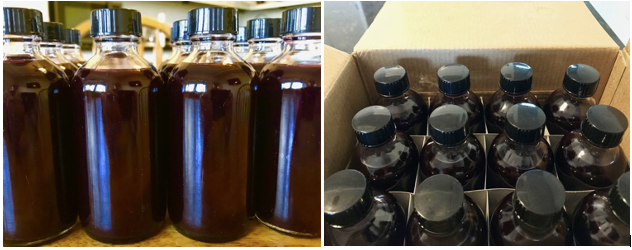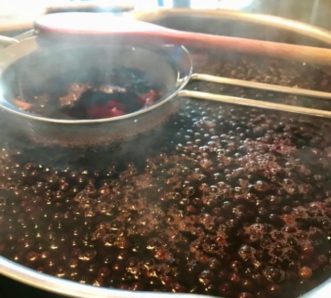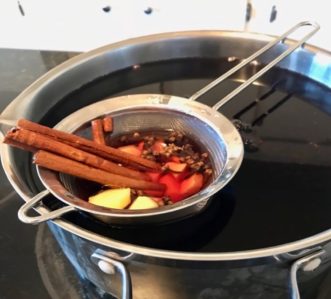Food producers in South Carolina are regulated to ensure they meet the food safety standards for protecting public health. The regulation requirements for elderberry syrup, a recent fast-growing food trend, can be complicated. This publication will help food producers make and sell elderberry syrup in South Carolina per the food safety and regulation requirements.
The production and sales requirements of elderberry syrup are oddly complicated. Elderberry syrup is unique because it can be sold retail or wholesale, classified as a food or dietary supplement, and prepared as a shelf-stable or refrigerated food. The information below describes how elderberry syrup is made and explains how it is classified and regulated and the food safety testing requirements.
Elderberry Overview
Elderberries (Sambucus nigra and Sambucus canadensis) are a small fruit and grow on bushes or trees. They are native to the northern hemisphere.1 Like many fruits and berries, elderberries have a reputation for being a good source of nutrition. Historically elderberries have been used worldwide for medicinal purposes.2
Elderberries can be toxic when eaten raw but are safe to eat when cooked.2 The standard preparation method of boiling them down to make a “syrup” or “gummy” makes them safe to eat (figure 1). Elderberries have a “high” pH, around pH 4.9, and are classified as a low acid food3 because the pH is not less than 4.6. Preparation and packaging requirements are based on the food safety implications of a fruit’s natural pH exceeding food safety standards.
The common method for preparing elderberry syrup is to add fresh or dehydrated elderberries to water and boil for one to two hours. The solids are strained out, resulting in elderberry-infused water – basically an “elderberry tea” (figure 2). The infused water is then added to some type of syrup (commonly honey) to make elderberry syrup. The syrup pH must be 4.1 or lower because elderberries are a low acid food. Raw honey is often added after the heat treatment. If the pH of the finished syrup is not 4.1 or lower, reformulation (acidification) will be required. Examples of acidifiers include lemon juice, orange juice, lime juice, and citric acid.
Considerations for Product Types
Producers should consider the following factors when deciding what type of product to produce and how to market and sell it.
Dietary Supplement
That means the syrup or gummies are not a food; they are a dietary supplement. The use of any expressed or implied health claims makes the product a dietary supplement, not a food. Supplements are regulated by the US Food and Drug Administration (FDA).4
The FDA suggests that producers visit www.fda.gov and search for elderberry syrup when creating the supplement label. Warning letters are issued for labeling violations, and preliminary research will help identify what the FDA enforces for advertisements and product labels. As the FDA cannot provide consultation, producers are encouraged to contact the Center for Food Safety and Applied Nutrition for assistance (CFSAN). Visit the CFSAN website for contact information.
The FDA also suggests that supplement manufacturers read through the current good practices in manufacturing, packaging, labeling, or holding operation for dietary supplements (21 CFR 111). The regulation is provided in detail on the Electronic Code of Federal Regulations (e-CFR) website.
Pros
- If your goal is to make health claims, you have more options when selling as a supplement.
- The retail store placement will help to convey health claims or benefits. It will likely be located in the pharmacy section with other supplements.
Cons
- Navigating FDA regulations can be daunting.
Support
- The Clemson Extension Food2Market Program offers testing for pH and water activity, with results written into a process control letter (if needed by the FDA). The Clemson Extension Food2Market program can also generate a supplement facts panel; however, the producer will be responsible for meeting FDA requirements.
Wholesale Food
If elderberry syrup is sold as a wholesale food, the producer is marketing the syrup as a food and plans to sell it to other businesses to resell. The SC Department of Agriculture (SCDA) regulates elderberry syrup sold as a wholesale food product.5 An overview of the process to become registered with SCDA is as follows:
- Produce food in an approved facility (a home kitchen is not approved). For details on an approved facility, consult the SCDA Food Processing Establishment Quick Guide.
- Have product(s) tested by a process authority.
- The pH of both shelf-stable and refrigerated elderberry syrups (figure 3) must be tested to ensure the finished pH is 4.1 or lower. If the finished pH is not 4.1 or lower, the syrup must be acidified. Most shelf-stable elderberry syrups will be classified as an “acidified food,” which will require that the producer attend a Better Process Control School for acidified foods and file their facility and process with the FDA.
- Clemson Extension’s Food2Market website (www.clemson.edu/extension/food2market) provides contact information for process authority testing.
- If the recipe is changed after product testing, the processing authority must re-test the product’s new recipe.
- Apply for your Registration Verification Certificate (RVC). This certificate must be obtained before products can be sold. Submitting this application initiates the first inspection of your facility and process.
- Have product labels reviewed by the SCDA.
- Have regular inspections by the SCDA.

Figure 3. Elderberry syrup may be prepared, stored, and transported under refrigeration or as a shelf-stable product. Image credit: Adair Hoover, Clemson University.
Pros
- In South Carolina, there is a clear path to registration with regulatory and educational support available throughout the process.
Cons
- No health claims are allowed, including word of mouth, social media, website, and packaging.
- Do not use the word “tonic” on the label or provide dosage instruction, as it will denote the product as a supplement.
- The placement of shelf-stable elderberry syrup (figure 3) in retail establishments (e.g., grocery stores, markets, etc.) will be with foods. For example, it could be placed next to pancake syrups.
Support
- The SCDA will require that you have the product tested for pH to sell a refrigerated or shelf-stable product. The Clemson Extension Food2Market Program can test and issue the results in a process control letter; however, there will likely be a thermal process recommendation for food safety. Many producers don’t like to incorporate a thermal process because it may diminish the “benefits” of raw honey.
- Clemson Extension Food2Market can also generate nutrition facts panels.
Direct to Consumer
This sales model would be regulated by the SC Department of Health and Environmental Control (DHEC). Producers should work with DHEC directly. A product may be able to be classified as non-potentially hazardous based on formulation. However, as a first step, DHEC will require initial (one-time) testing for pH by a Process Authority.
Process Options for Retail
- Permitted retail food establishment: Sell product as refrigerated food, with pH of each batch confirmed to be 4.1 or lower. Recipe, process instructions, and testing report submitted to DHEC for review. Facility must test each batch to confirm pH is less than 4.1.
- Permitted retail food establishment: Sell product as shelf-stable food, with pH of each batch confirmed to be 4.6 or lower. Product prepared according to Process Authority guidance. Recipe, process instructions, copies of process letter, and BPCS certificate submitted to DHEC for review. Facility must test each batch to confirm pH 4.6 or lower.
- If the product’s recipe is changed after product testing and approval by DHEC, then the product’s new recipe must be re-tested and approved.
- No health claims are allowed, including word of mouth, social media, website, and packaging. You will only be able to produce as a food product and sell directly to the end consumer. If the product is to be sold as shelf-stable, a thermal bottling process for acidified food will be required, and the operator will also require Better Process Control certification.
Pros
- The advantage to this route is that you will get direct feedback from consumers; DHEC will guide you through the permit process, and educational support is available throughout the process.
Cons
- You will only be able to produce as a food product, with no health claims, and only direct to the end consumer.
Support
- Contact DHEC regulators directly for guidance by email to foodvariances@dhec.sc.gov.
Elderberry Nutrition
When elderberries are infused into water and then strained out, it is impossible to know the exact quantity of retained nutrients. For more accurate measures, a physical analysis should be performed. The Clemson Extension Food2Market lab does not perform physical testing.
Contact the following labs to inquire about physical testing:
- The University of Missouri-Columbia Agriculture Experiment Station Chemical Laboratories website
- Merieux NutriSciences Labs website
References Cited
- Lee J, Finn CE. Anthocyanins and other polyphenolics in American elderberry (Sambucus canadensis) and European elderberry (S. nigra) cultivars. Journal of the Science of Food and Agriculture. 2007 Nov;87(14):2665–75.
- Senica M, Stampar F, Veberic R, Mikulic-Petkovsek M. Processed elderberry (Sambucus nigra L.) products: A beneficial or harmful food alternative? LWT-Food Science and Technology. 2016 Oct;72:182–8.
- Schmultz P, Barefoot S. Canning foods, the pH factor. Clemson (SC): Clemson Cooperative Extension, Home & Garden Information Center; Aug 2011. HGIC 3030. https://hgic.clemson.edu/factsheet/canning-foods-the-ph-factor/.
- Dietary Supplements. Silver Spring (MD): US Food and Drug Administration (FDA); 2019 Aug. https://www.fda.gov/food/dietary-supplements.
- Food Safety Compliance. Columbia (SC): SC Department of Agriculture. 2021. https://agriculture.sc.gov/divisions/consumer-protection/food-safety-compliance/.
- Selling Food in South Carolina. Columbia (SC): SC Department of Health and Environmental Control; 2021. https://scdhec.gov/food-safety/retail-food.



